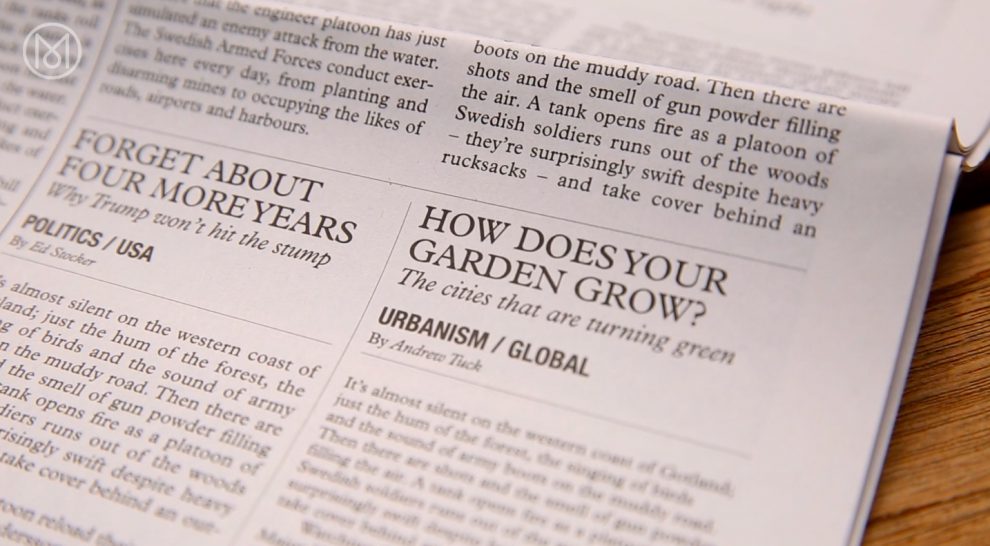
What’s your go-to print newspaper to read while you take your long August vacation?
In a completely consistent-with-the-brand move, Monocle is publishing and selling a 48-page weekly newspaper for four weeks in August, “a time of year when people have the luxury and time to read,” and when advertisers are looking to target Europeans on holiday, according to Monocle founder and editor-in-chief Tyler Brûlé.Each paper will consist of 48 pages — three full sections — of global news and opinion, as well as business, arts, culture, architecture and design, food, wine, fashion, and sports. It’ll be printed on high quality paper at the press of Italian publisher Athesia, located in a German-speaking region of Northern Italy (here’s a real photo of the city; enjoy).
Monocle’s Summer Weekly is already a profitable project financed through advertising. You can preorder for shipping the four-week bundle for £45, and within a day after announcing the Summer Weekly, Monocle brought in another £20,000 from preorders, according to Brûlé. Individual issues will also be available for purchase at newsstands on Thursdays for £5 (or appropriate amounts in euros, Swiss francs, or dollars).

The idea for the Summer Weekly first emerged after one of its advertisers suggested the Monocle team come up with a special project they could work together on. It had already been interested in stretching its editorial muscle beyond its main editorial product, a monthly print global affairs and lifestyle magazine with 80,251 subscribers, as well as its newer 24-hour online radio station, which serves as its main digital play.
“We were challenged earlier in the year by one of our big advertisers, who told us, ‘Let’s do something interesting together — if you can think of a great concept, we’d love to venture forth and do something with you,'” Brûlé said. “We had arrived at the point where we had been thinking: Could we do something daily? Or should we do something weekly? We’ve spent a lot of time looking at the state of the international news market and looking at what’s working and what’s not working, and there’s an interesting model that’s getting ignored somewhat in English-language media.” He cited weekly German newspaper Die Zeit, which comes out on Thursdays and is “a great lead into the weekend,” as one inspiration.
“We have the opportunity here to do something new, within a tighter geography,” Brûlé said. “There’s still plenty of real estate to be covered, and when we started to look at logistics, it became this very interesting exercise in rethinking newspaper business model.”
Ads are priced at $20,000 per full page, restricted to one brand per sector (for instance, only one fashion brand). The digital presence of Summer Weekly will consist of a mobile-friendly preview that goes up online before the issue hits newsstands. “We discussed it with a lot of clients, and I’m not saying no one is interested, but most were focused on the print. They say, ‘We love the idea someone is doing something on newsprint again.'”The Summer Weekly will be staffed by Monocle writers and editors (its New York and Hong Kong bureau chiefs will also help out as weekly editors), its existing network of correspondents, and other freelance writers and designers. A staffer on the radio side will also be involved in planning for the print weekly. The paper will be reacting to the news, Brûlé said, while also experimenting with articles longer than even those in its monthly print issue (as long as 2,000 to 3,000 words), since it’s targeting weekend readers, likely on vacation, with some time to indulge. The paper has a “Portugal–Spain–Italy–France–Germany–Austria–Switzerland–U.K. focus, for sure,” but according to Brûlé it will also include “contributions from Japan, Singapore, Hong Kong, a little Washington, New York, Toronto.” (True to its spirit of being “globalist chic,” paper’s front page will pronounce it as “developed in Zurich, edited in London, printed in Northern Italy.”)
The challenge for this short-run summer print newspaper printed in Northern Italy is mostly self-inflicted — “I’m not sure how snappy Italian post is in the month of August. But that’s the experimental side of this, and we haven’t banked a lot on building out a huge subscriber base,” Brûlé said. “We’re really focusing on getting the people in their European rhythm, who are on their way to the beach, who stop by the newsstand on their bicycles, who pick up copies in the hotel lobby, who are in and out of airports on holiday or business.”
As for whether the project will be repeated, “we’ll see how this goes,” Brûlé said. In the meantime, the weekly is also serving as an interesting editorial exercise.
“You want to have a profitable venture and you want to challenge the market, but it’s also great for keeping people nimble,” he said. “We’re doing parallel story meetings now, for the radio, for the October and November Monocle issues, for this, and people are discovering and pointing out, ‘that should be a newspaper story,’ ‘that should be a magazine story.'”